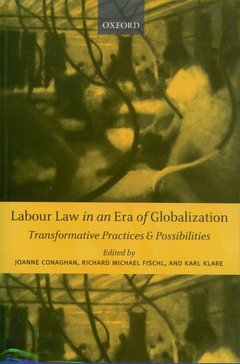Description
Labour Law in an Era of Globalization
Transformative Practices and Possibilities
Coordinators: Conaghan Joanne, Fischl Richard Michael, Klare Karl
Language: English
Subject for Labour Law in an Era of Globalization:
Labour law in an era of globalization transformative practices and possibilities
Publication date: 01-2004
578 p. · 15.6x23.2 cm · Paperback
Publication date: 01-2004
578 p. · 15.6x23.2 cm · Paperback
Labour law in an era of globalization transformative practices and possibilities
Publication date: 03-2002
578 p. · 16.4x24.3 cm · Hardback
Publication date: 03-2002
578 p. · 16.4x24.3 cm · Hardback
Description
/li>Contents
/li>Readership
/li>Biography
/li>Comment
/li>
Throughout the industrial world, the discipline of labour law has fallen into deep philosophical and policy crisis, at the same time as new theoretical approaches make it a field of considerable intellectual ferment. Modern labour law evolved in a symbiotic relationship with a postwar institutional and policy agenda, the social, economic, and political underpinnings of which have gradually eroded in the context of accelerating international economic integration and wage-competition, a decline in the capacity of the nation-state to steer economic progress, the ascendancy of fiscal austerity and monetarism over Keynesian/welfare state politics, the appearance of post-industrial production models, the proliferation of contingent employment relationships, the fragmentation of class-based identities and emergence of new social movements, and the significantly increased participation of women in paid work. These developments offer many appealing possibilities - the opportunity, for example, to contest the gender division of labour and re-think the boundaries between immigration and labour policy. But they also hold out quite threatening prospects - including increased unemployment and inequality and the decline of workers' organizations and social participation - in the context of proliferating constraints imposed by international financial pressures on enacting redistributive social and economic policies. New strategies must be developed to meet these challenges. These essays - which are the product of a transnational comparative dialogue among academics and practitioners in labour law and related legal fields, including social security, immigration, trade, and development - identify, analyse, and respond to some of the conceptual and policy challenges posed by globalization.
Part. Part 1: Labour Law in Transition. 1: Karl Klare: The Horizons of Transformative Labour and Employment Law, 2: Massimo D'Antona: Labour Law at the Century's End: An Identity Crisis?, Part. Part 2: Contested Categories. Work, Worker, and Employment, 3: Joanne Conaghan: Women, Work, and Family: A British Revolution?, 4: Paul Benjamin: Who Needs Labour Law? Defining the Scope of Labour Protection, 5: Lucy Williams: Beyond Labour Law's Parochialism: A Re-envisioning of the Discourse of Distribution, Part. Part 3: Globalization and Its Discontents. 6: Kerry Rittich: Feminization and Contingency: Regulating the Stakes of Work for Women, 7: Brian A. Langille: Seeking Post-Seattle Clarity - and Inspiration, 8: Dennis M. Davis: Death of a Labour Lawyer?, Part. Part 4: Same as the Old Boss. The Firm, the Employment Contract, and the 'New' Economy, 9: Simon Deakin: The Many Futures of the Contract of Employment, 10: Paddy Ireland: From Amelioration to Transformation: Capitalism, the Market, and Corporate Reform, 11: Makoto Ishida: Death and Suicide from Overwork: The Japanese Workplace and Labour Law, 12: Alan Hyde: A Closer Look at the Emerging Employment Law of Silicon Valley's High-Velocity Labour Market, 13: Richard Michael Fischl: 'A Domain into which the King's writ does not seek to run': Workplace Justice in the Shadow of Employment-at-Will, Part. Part 5: Border.States: Immigration, Citizenship, and Community, 14: Guy Mundlak: The Limits of Labour Law in a Fungible Community, 15: Bruno Caruso: Immigration Policies in Southern Europe: More State, Less Market?, 16: Margriet Kraamwinkel: The Imagined European Community: Are Housewives European Citizens?, 17: Linda Bosniak: Critical Reflections on 'Citizenship' as a Progressive Aspiration, Part. Part 6: Labour Solidarity in an Era of Globalization. Opportunities and Challenges, 18: Frances Raday: The Decline of Union Power - Structural Inevitability or Policy Choice?, 19: James Atleson: The Voyage of the Neptune Jade: Transnational Labour Solidarity and the Obstacles of Domestic Law, 20: Carlos de Buen Unna: Mexican Trade Unionism in a Time of Transition, 21: Maria L. Ontiveros: A New Course for Labour Unions: Identity-based Organizing as a Response to Globalization, 22: Michael Selmi and Molly S. McUsic: Difference and Solidarity: Unions in a Postmodern Age, Part. Part 7: Laying Down the Law. Strategies and Frontiers, 23: Hugh Collins: Is There a Third Way in Labour Law?, 24: Harry Arthurs: Private Ordering and Workers' Rights in the Global Economy: Corporate Codes of Conduct as a Regime of Labour Market Regulation, 25: Claire Kilpatrick: Emancipation through Law or the Emasculation of Law? The Nation-State, the EU, and Gender Equality at Work, 26: Dennis Davis, Patrick Macklem, and Guy Mundlak: Social Rights, Social Citizenship, and Transformative Constitutionalism: A Comparative Assessment, Index
Academics, researchers, and policy-makers with an interest in labour law and workers' rights issues, welfare, immigration, human rights, international trade, feminist and critical race studies, and corporate law, scholars and students of in
Joanne Conaghan is Professor of Law at the University of Kent at Canterbury. Richard Michael Fischl is Professor of Law at the University of Miami. Karl Klare is Professor of Law at Northeastern University. They are co-secretaries of INTELL-International Network on Transformative Employment and Labour Law-from whose recent conferences these essays have emerged.
© 2024 LAVOISIER S.A.S.




